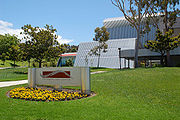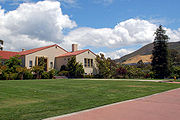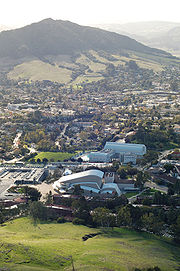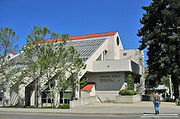- Cal Poly
-
Université d'État polytechnique de Californie
Université d'État polytechnique de Californie Devise Discere Faciendo ("Apprendre en faisant") Nom original California Polytechnic State University Informations Fondation 1901 Type Publique Budget $186 000 000 Localisation San Luis Obispo, États-Unis Président Warren J. Baker Étudiants 17 777 Affiliation Université d'État de Californie Site web [1] modifier 
L'Université d'État polytechnique de Californie, abrégée familièrement Cal Poly, est une université publique californienne située près de San Luis Obispo. Cal Poly fait partie des 23 campus de l'Université d'État de Californie et est l'université la plus étendue en surface de l'État.[1] L'université permet de suivre un grand nombre de cursus grâce à ses 7 spécialités, mais elle est surtout connue pour ses cursus d'ingénieurs, d'agriculture, d'architecture, d'économie et d'arts graphiques. On compte actuellement 117 000 anciens élèves de Cal Poly et les effectifs de l'année 2006-2007 s'élevaient à 17 777 étudiants.[2][1]
Sommaire
Histoire
Généralités
Cal Poly a été fondée en 1901 lors que le gouverneur Henry Sage a promulgué la loi sur l'enseignement polytechnique de Californie. L'École Polytechnique de Californie a été construite près de San Luis Obispo et les premiers étudiants 9 au nombre de 20) sont arrivés le 30 septembre 1903 qui suivaient des cours du seconde degré. L'école s'est développée de manière continue depuis, à l'exception d'une période s'étendant de la moitié des années 1910 au début des années 1920 en raison de la Première Guerre mondiale.
En 1924 Cal Poly passe sous le contrôle du ministère californien de l'éducation. En 1933 ce même ministère modifia la durée du cursus et la fait passer à deux ans et transforma l'école en un institut de formation professionnelle. Cal Poly commença a délivrer une maîtrise d'Arts en 1940 et change son nom en Collège polytechnique de l'État de Californie en 1947 pour mieux refléter les divers cursus offerts. En 1960, le contrôle de Cal Poly et de toutes les autres université d'État a été transféré depuis le ministère de l'Éducation californien vers un Conseil d'Administration indépendant, qui deviendra ensuite le système d'Université d'État de Californie.
En 1967, Cal Poly est autorisé à délivrer l'équivalent du DEA. Entre 1967 et 1970, les études sont réorganisées en différentes unités ( comme l'École de Mathématiques et de Science, l'École d'Agriculture et des ressources Naturelles, et l'École d'Architecture, créée en 1968). Cal Poly possède sa propre radio FM : KPCR. Les lois de Californie ont modifié une nouvelle fois son nom en Université d'État Polytechnique de Californie. Depuis 1970, l'Université a vu les candidatures d'étudiants augmenter continuellement et la construction de nombreux bâtiments sur le campus.
Relations avec Cal Poly Pomona
Cal Poly Pomona a commencé comme un campus annexe de Cal Poly en 1938 grâce à un don de Charles Voorhis et son fils consistant en une école tout équipée et une ferme. La Fondation W.K. Kellogg a donné un ranch de 3,3 kilomètres carrés situé à Pomona à Cal Poly en 1949. Situé à environ 2 km du campus Voorhis, l'ensemble a été appelé le campus Voorhis-Kellogg. En 1966, le campus Voorhis-Kellogg s'est émancipé de Cal Poly pour devenir indépendant sous le nom de L'université Cal Poly à Pomona. Depuis 1949, les deux universités construisent conjointement un char pour la Rose Parade, et il constitue le char le plus ancien présent de manière continue à cette parade. C'est également le seul char entièrement construit par des étudiants.
Accident d'avion de l'équipe de football
Le 29 octobre 1960, un avion transportant l'équipe de football de Cal Poly s'écrase au décollage à l'aéroport de Toledo (Ohio). 18 des 48 personnes à bord sont tuées, dont 16 joueurs et le manager de l'équipe. La peur de voler de John Madden est souvent attribuée à cet accident bien qu'il ai dit à de nombreuses reprises que c'est sa claustrophobie qui en est la cause. John Madden, qui fut membre de cette équipe de football lors de la saison 1957-1958 connaissait un grand nombre de membres de l'équipe ayant disparu. Parmi les survivants se trouvent le quarterback Ted Tollner qui est devenu ensuite le coach des équipes de l'université de Californie du Sud et de celle de l'Université d'État à San Diego.
On Thanksgiving Day, November 23, 1961, LA County Supervisor Warren Dorn and Bob Hope provided a "Mercy Bowl" in the Los Angeles Memorial Coliseum between Fresno State and Bowling Green State to raise a memorial fund for the survivors and bereaved families. The event raised about $200,000. As of 2006, memorial plaques for the crash can be found on campus at Mott Gym and the Mustang horse statue. A permanent memorial plaza opened with the new Alex G. Spanos Stadium. The memorial has 18 piliers de cuivre, one for each of the team members who died in the crash. Each copper pillar rises to the height of the player honored, and is adorned with a plaque about that player's life.
Mixité
Cal Poly était mixte à son ouverture, et la première promotion comptait 40 garçons et 12 filles. Après 1930, les femmes ont été interdite dans toute l'école, et n'y furent réadmis qu'à partir de 1957. De nos jours, Cal Poly est toujours mixte.
Organization
As of 2007, the president of Cal Poly is Warren J. Baker who has been the president since 1979.[3]
Cal Poly Corporation
The Cal Poly Corporation is a separate non-profit 501(c) corporation operating in concert with the university. Its primary role is to furnish non-academic services for the university such as eateries, the bookstore, and endowment administration. This arrangement is relatively common at many of California's public universities. The corporation was founded in 1941, and it was known as the Cal Poly Foundation until February 1, 2006.
Campus
Cal Poly owns more land than any other California university with the exception of UC Berkeley. There are 9,678 acres (39 km²) in total. The lands are used for student education, mainly agriculture. The lands include the main campus, two nearby agricultural lands and two properties in Comté de Santa Cruz.
Expansion
The Cal Poly Master Plan calls to increase student population from approximately 17,000 students to 20,000 students by the year 2020-2021. In order to maintain "Learn by Doing" philosophy and low class size classes, the master plan calls for an increase in classrooms, laboratories, and professors.
Current construction
- Bella Montana Faculty/Staff Housing
- Will provide inexpensive housing for future and current Cal Poly Faculty and Staff, in order to promote expansion of Cal Poly Faculty and reduce automobile traffic in Cal Poly. (CONSTRUCTION COMPLETED in August 2007)
- Housing Administration
- Will provide larger building for an expanding housing administration due to the increasing on-campus students. This is due to the construction of Poly Canyon Village apartments. (CONSTRUCTION COMPLETED in September 2007)
- Poly Canyon Village
- The largest single housing project on any campus in America. They are apartments which will double the amount of students living on-campus, lower price of surrounding housing, and decrease automobile traffic in Cal Poly. The project also aims to include retail space and become the "hub" of Cal Poly. This on-campus housing is designed for second year students. First phase of housing will be open in Fall of 2008.
- Engineering/Architecture Renovation and Replacement
- Include a new building which will provide 46,000 square feet of space of classrooms, laboratories, and rooms for student related needs/activities.[4]
Commuting
Campus parking is somewhat limited. In its most recent survey of available parking spaces on campus, the Cal Poly University Police reported 2,615 general purpose parking spaces, 1,635 dorm resident spaces, and 6,621 total spaces.[5] In its facilities Master Plan, the university admits that while more parking spots will be added, the actual ratio of parking to students will decrease since enrollment is expected to increase sharply.[6] To resolve the disparity, the Master Plan calls on the university to reduce the demand for individual vehicle parking. As part of that plan, the university has constructed additional dorms and has tried to make campus life more enjoyable. However, many students would prefer not to live on campus for a variety of reasons, including the campus-wide ban on alcohol and mandatory meal plan. Recently, the school launched a public information campaign called "Options", which seeks to educate students on commuting alternatives, though it is not clear that the campaign has had any effect.
Bicycle racks are available throughout the campus, but the off-campus student population is mostly centered in areas either close enough to walk or areas judged to be too far to ride a bicycle. The city's SLO Transit bus system provides service to and from campus. Since the buses are partially subsidized by student tuition, Cal Poly students can ride for free.
Academics
Colleges
The university currently offers bachelor's and master's degrees in seven colleges:
- College of Agriculture, Food and Environmental Sciences
- College of Architecture and Environmental Design
- Orfaela College of Business
- College of Education
- College of Engineering
- College of Liberal Arts
- College of Science and Mathematics
Ranking
According to U.S. News & World Report's 2008 America's Best Colleges report, Cal Poly is ranked #1 in the Western United States for public schools whose highest degree is a master's. The College of Engineering was also ranked the #1 public undergraduate school (#4 overall) in the nation whose highest degree is a master's. Specific engineering programs were ranked:
- Electrical Engineering: #1
- Computer Engineering: #1
- Mechanical Engineering: #1
- Industrial Engineering: #1
- Aerospace Engineering: #2
- Civil Engineering: #2
In a 2006 poll conducted by the leading architecture and engineering journal DesignIntelligence, Cal Poly was voted the number three architecture school in the nation. The landscape architecture program was ranked in the top ten.[9],[10]
Cal Poly’s City and Regional Planning graduate program ranked highly in the Planetizen 2007 Guide to Graduate Urban Planning Programs.[11]
Admissions
Cal Poly has a highly competitive admissions process. For the fall of 2007, Cal Poly received a record number of applications for the 13th year in a row. They had over 35,000 students apply with only 4,700 spaces available. The average high school GPA of admitted freshmen was 3.80. The average SAT 1 score was 1235 (based on reading and math scores only).[12]
Students are required to declare a major when they apply for admission and each candidate is judged against others applying to that major. Because of this, there are differences in the percentage of students admitted between majors. To prevent students from applying for an easy major and transferring to another major, the transfer process has been made difficult.
Tuition
The fall 2007 tuition for the average student was US$1,563 per quarter.[13]
Endowment
Cal Poly’s endowment more than tripled during its Centennial Campaign from US$43.1 million to US$140.1 million. It is now the largest in the CSU system, representing one-fifth of all endowed funds in the 23-campus system. Growth is attributed to gifts and prudent stewardship.
Student life
Residence halls
There are four styles of residence halls on the Cal Poly campus. The five North Mountain halls are the oldest on campus and were constructed during the 1950s. The Sierra Madre and Yosemite halls were finished by 1968, the six Red Bricks were built in the 1960s, and Cerro Vista was completed in 2003. Construction on a new on-campus apartment complex, Poly Canyon Village, began in 2006.
Each of the residence halls represent a different living community on campus. The six red-brick halls are the Living-Learning Program halls for the different colleges of Cal Poly. The five North Mountain halls are organizationally a part of the engineering Living-Learning Program. The Sierra Madre and Yosemite halls are the First-Year Connection Program halls and focus on freshman-oriented transition programs. All buildings house students of all majors. The Cerro Vista Apartments is the Sophomore Success Program community and helps students transition into independent living. The total on-campus population is 3,600 (as of 2006), but will grow to over 6,300 after the Poly Canyon Village Apartments are completely opened in fall 2009.
Greek life
Since 1949, Greek organizations have been present at Cal Poly. The Greek community consists of three governing councils at Cal Poly: Cultural Greek Council, Interfraternity Council and Panhellenic Association.
Athletics
Fichier:CalPolyMustangs.pngCal Poly Mustangs logoCal Poly fields 20 varsity sports. The school's mascot is the Mustang. Sports teams participate in the NCAA's Division I. Cal Poly athletics generally compete in the Big West Conference, with football and wrestling being the exception. Cal Poly's wrestling team is a member of the PAC-10 Conference. Prior to joining Division I in the mid 90's, the school won 35 national championships.[14] Football plays in the Great West Football Conference. Their football team is notable for being the first Great West Football Conference participant in the Division I-AA (now known as FCS) playoffs. The Mustang Maniacs are Cal Poly's spirit group. They support the team both away and at home. The team also plays the University of California, Davis in the annual Horseshoe Classic for the Golden Horseshoe (trophy). The Mustang basketball team had its most successful year in 2007, when the team came within one win in the Big West basketball tournament of getting into the NCAA basketball tournament
Fight Song
Cal Poly Fight Song (a.k.a. Ride High You Mustangs)
Ride High You Mustangs,
Kick the frost out, burn the breeze,
Ride High You Mustangs,
The bow wows we'll knock to their knees
Hi Ki Yi
Ride High You Mustangs
Chin the moon and do it right
Ride High and cut a rusty
Fight! Fight! FightVoir aussi
- List of California Polytechnic State University alumni
- Alex G. Spanos Stadium
- Center for Coastal Marine Sciences
- Leaning Pine Arboretum
- Mercy Bowl
- Cal Poly Mustang Band
Notes
- ↑ a et b Quick Facts, Cal Poly. Consulté le 2007-02-10
- ↑ Simply the Best, Cal Poly. Consulté le 2007-02-10
- ↑ Cal Poly President Earns Top CEO Leadership Award, Cal Poly. Consulté le 2007-02-13
- ↑ Cal Poly Campus Master Plan Cal Poly Facilities Planning and Capital Projects, July 7, 2007
- ↑ Parking Lot Survey Cal Poly University Policy Department, January 20, 2006
- ↑ Cal Poly Campus Master Plan Cal Poly Facilities Planning and Capital Projects, March 21, 2001
- ↑ America's Best Colleges, U.S. News & World Report. Consulté le 2008-08-18
- ↑ Cal Poly Simply the Best, Cal Poly. Consulté le 2008-08-18
- ↑ Architecture School Ranking, DesignIntelligence. Consulté le 2007-02-05
- ↑ Cal Poly’s Architecture and Landscape Architecture Programs Move Up in National Rankings, Cal Poly. Consulté le 2007-02-05
- ↑ Planetizen 2007 Guide to Graduate Urban Planning Programs, Planetizen. Consulté le 2007-02-05
- ↑ Cal Poly, the Profile, Cal Poly. Consulté le 2007-08-14
- ↑ Cal Poly Student Accounts, Fee Payment Policy
- ↑ The Official Website of Cal Poly Athletics. Consulté le 2007-04-07
- (en) Cet article est partiellement ou en totalité issu d’une traduction de l’article de Wikipédia en anglais intitulé « California_Polytechnic_State_University ».

Université d’État de Californie 
Bakersfield | Channel Islands | Chico | Dominguez Hills | East Bay | Fresno | Fullerton | Humboldt | Long Beach | Los Angeles | Maritime | Monterey Bay | Northridge | Pomona | Sacramento | San Bernardino | San Diego | San Francisco | San José | San Luis Obispo | San Marcos | Sonoma | Stanislaus - Portail des États-Unis
- Portail de la Californie
Catégorie : Université d'État de Californie
Wikimedia Foundation. 2010.






